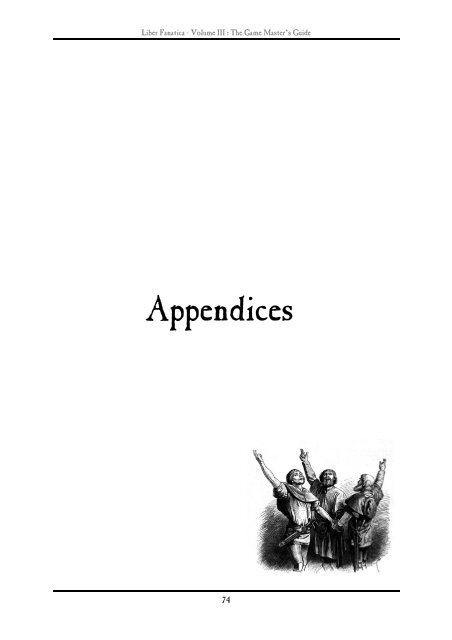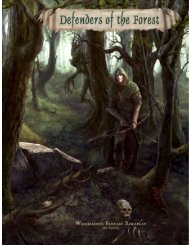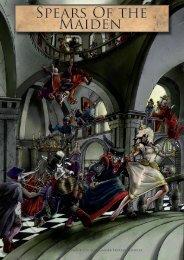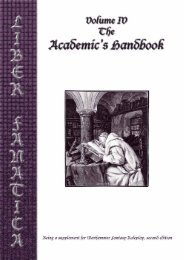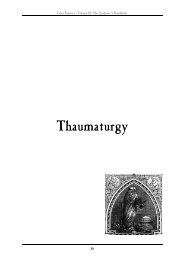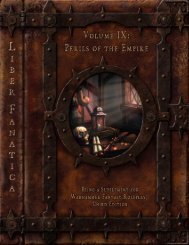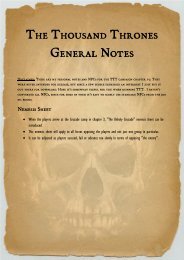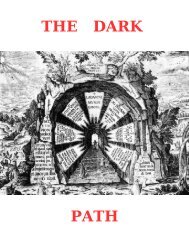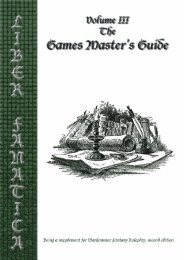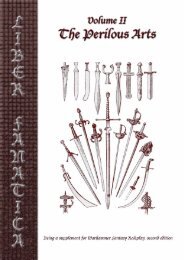992 KB Download - Liber Fanatica
992 KB Download - Liber Fanatica
992 KB Download - Liber Fanatica
You also want an ePaper? Increase the reach of your titles
YUMPU automatically turns print PDFs into web optimized ePapers that Google loves.
<strong>Liber</strong> <strong>Fanatica</strong> - Volume III : The Game Master’s GuideAppendices74
<strong>Liber</strong> <strong>Fanatica</strong> - Volume III : The Game Master’s Guideto commit an entire evening every week or monthto do so.There are also a lot of people who are intriguedby roleplaying but are too shy, old, young ornervous to plunge cold turkey into a roundtablegame with a bunch of people they have nevermet. A PBEM can provide a perfect opportunity toplay or just try out a game without a majorcommitment or time or courage.PitfallsIt’s slowNobody can claim that PBEM games are fastpaced. The actual pace is determined partly bythe GM, and partly by the players. But a PBEM isnever going to be able to match that of a group ofplayers and a GM sitting together round a table.It’s also worth noting that just as the speed of aconvoy is determined by that of the slowest shipso the speed of a PBEM is determined by that ofits slowest player.It’s not very sociableIf one of the reasons you play a game is to makenew friends or meet with your mates then aPBEM can be disappointing. Drinking a beerwhilst typing in a player response is just not thesame as sitting round a table with six friends.There is nothing to stop players fromcommunicating directly by email or even phonebut I find most social interaction between playersactually takes place ‘in game’ via theircharacters. Most players refer to other players bytheir character names and very often don’t evenknow what their real names are.It lacks diceIt is said that when Austrian Army Officers firstheard of the new Kriegspiel being played by theirPrussian counterparts they were veryenthusiastic and put a lot of pressure on theAustrian government to introduce the game attheir military academies.However, they quickly tired of it when theyrealised that the rules did not allow them to usedice to determine the outcomes. Players joining aPBEM may be equally disappointed as there islittle one can do in practical terms to allowplayers to roll their own dice and for some thismay take away a major part of the fun of playing.Accurate location detailOne of the biggest challenges for a GM running aPBEM is making sure the players know exactlywhere their characters are standing and whereeverything else is in relation to them.In a round table game a GM can resort to quicksketch maps, the use of miniature figurines andeven use the salt and pepper pot, if all else fails.But unless the PBEM game being played comeswith a purpose built electronic mapping system,the GM of a PBEM is left with nothing but wordsto describe where everything and everyone islocated, and sometimes words are just notenough.Finding PlayersIf you were planning to play a roundtable game itis likely you would already have a group ofplayers in mind. In most cases a group of friendsexist before the game itself. This is much lesslikely with PBEM game and the chances are youhave already decided to run a game and are nowlooking for players to join it.Players are the most important part of any gameand to be a success the game needs to match theexpectations of its players. Unfortunately, whatmakes a good tabletop game player does notnecessarily make a good PBEM player, andplayers who enjoy a tabletop game don’t alwaysenjoy its PBEM equivalent.A bored or frustrated player can be a majorheadache both for you as the GM and for the76
<strong>Liber</strong> <strong>Fanatica</strong> - Volume III : The Game Master’s Guideother players in the game and so finding andselecting the right players for your game canmake the difference between it being a success ora failure.The best way to attract players is to advertiseyour game on the appropriate forums. Somegame sites actually have databases of playerslooking for games.My own WFRP PBEM is still advertised on theWFRP Directory run by Glen Sharman(http://wfrpdb.shargl.net/intro.php) and hasobtained a number of new players as a result.I also used a simple online player applicationform on my sons WFRP website, whichprospective players can fill in and submit.PBEM Player GuideAlthough this is a GM Guide I thought it wouldbe incomplete if I did not include some tips andguidance for those who join PBEM games asplayers.Reasonable ExpectationsThe first point to make is that PBEM games arenot for everyone. Read the Pro’s and Con’ssection of the GM guide and you will see thatPBEM games have both advantages anddisadvantages.Most notably, they are slow paced and they lackthe excitement of rolling large numbers of dice.So, don’t expect to see your PBEM character riserapidly up the development tree to become asuper-hero and don’t expect to wade rapidlythrough an entire scenario in a few weeks.PBEM gamers need to recognise that they are infor a long-haul which might take years tocomplete and modify their expectationsaccordingly.That said PBEM games still offer a lot ofadvantages in terms of roleplay andcharacterisation. They provide players withplenty of time to consider their responses andresearch their characters background. Make themost of that time and you will get a lot of fun andenjoyment out of your PBEM experience.Message Management (from a playersperspective)It a good idea to keep your game Emails in aseparate mail folder.If your GM is using a standard subject lineformat then a simple Email rule can be devisedthat will automatically spot an incoming gamemessage and redirect it to your Game Folder.Remember to move your replies from your sentfolder to your game folder so that you have arecord of all your responses.If you are using Web Based Email or multipleEmail accounts consider keeping a journal of GMNotes and Responses and copying their contentinto it so that you have a full and completehistory of recent events in the game.Formulating a response.Many new PBEM players have difficultformulating their responses, so I thought I wouldprovide a checklist of things to consider.Who are you?It may sound obvious but one of the mostcommon errors in player responses is not makingit clear who you are, both in real life and in thegame.Always put the name of your Character at thestart of your reply and when writing to the GM‘out of character’ use your real name but remindthe GM which character you are playing in thegame.e.g. David (aka Drachenfels)Read the GM Note…AgainIt is always worth reading the GM Note again justbefore you send your response. Just to makesure you haven’t misread or overlookedsomething.Dealing with ‘What If’s’Before you send your response give some thoughtto what you want your character to do if thingsdon’t go as planned. It’s impossible to coverevery eventuality but think about the most likelythings that may happen during the next gameturn and let the GM know how you want yourcharacter to react if they do.Stay in CharacterTry to keep your reply ‘in character’. Many playerresponses include both ‘in character’ instructionsand amusing personal asides aimed at the GM. Ifyou decide to do this make sure it is clear whichare which, particularly if you are writing in thefirst person. ‘Out of Character’ comments can bevery confusing for a GM, particularly if they aremixed in with character instructions.Make your intentions clearWhilst, in postal chess it’s normal practice just tosend your opponent your next move, in an RPGgame it helps the GM understand your intentionsif you explain why you are making that move andwhat you hope to achieve as a result. Someplayers do this as an extension of theircharacterisation and a good GM will use yourintentions as a guide on how to carry yourinstructions out.Talking to the GMThere will be times when you wish to talk directlyto the GM. Either to ask a question or to let himknow you are going away from a few days. Try tokeep these messages separate from your playerresponses. If you send them as a separate Emailremember to mention who your character is inthe game, but there is nothing wrong withtacking such messages on the bottom of a gameresponse as long as you make it clear that theyare not part of the response itself.77
<strong>Liber</strong> <strong>Fanatica</strong> - Volume III : The Game Master’s GuideMemory ManagementI know I keep saying this but, PBEM games areslow. It might take weeks, months or even yearsfor a plot to develop to the final showdown. A fewdays in game time might be weeks in real life,during which period you may have been to work,been on holiday and perhaps even been involvedin other games.Over that time you will probably have received upto three GM Notes a week containing all sorts ofinformation from NPC names, clues, locations,maps, notes and background detail.The biggest problem players have is trying toremember everything that has happened in thegame. Little wonder then, that most PC’s in mygame seemed to have very bad memories.My advice is simple…..Keep a Game Journal.This might seem a bit bureaucratic but it will paydividends in the long run. Such a journal shouldnot contain a complete record of everything, butshould just be used to record any thing whichyou think might be important and might beneeded later in the game. It can be sub-dividedhowever you wish with sections for Maps, NPC’s,Clues etc. and will provide a quick aide memoirover the weeks and months to come. If your GMis using the numbering system suggested in theGM Guide you can use this to cross-referenceyour notes back to the full message.Away from your computer?If you know you are going to be away from yourcomputer for a few days or weeks it’s a good ideato let your GM know. That way they will notexpect a response from you over that period andso your absence will not slow down the game.It is also a good idea to inform the GM what yourintentions are for your character over the periodyou are away. It’s unlikely that your characterwill be allowed to sit and do nothing and the GMwill probably take personal control of it until youreturn. So, any instructions you wish to give theGM on how to look after your character in yourabsence will be useful in making sure that youdon’t have a nasty shock waiting for you whenyou get back.And finally…PBEM gaming can be one of the most rewardingtypes of roleplaying, or one of the mostfrustrating. My advice to anyone is that if itstarts to becoming more like work than fun, thenthe best thing you can do is take a break from it.A GM who is tired and bored will make the wholegame unpleasant and tedious for everyoneinvolved.Also, if you are playing in a PBEM game and youare unhappy with how things are going, thenwrite to the GM and discuss why you are nothaving fun. A good GM will want to hearconstructive criticism and may be able to adjusthis style to meet your expectations.But most of all have fun, isn’t that the wholepoint of why you’re gaming!Want more?The full-length version of this articlecan be found online at the<strong>Liber</strong> <strong>Fanatica</strong> webpage!78
<strong>Liber</strong> <strong>Fanatica</strong> - Volume III : The Game Master’s GuidePlaying WFRP using Online Chatby Jude HornborgRoleplaying online in real-time is quite adifferent experience from sitting around yourliving room table. There are no dedicated WFRPplay-by-chat utilities (yet), but a number ofgeneric software programs can be used to playWFRP over the internet:MSN Messenger, AOL Instant Messenger (AIM) orICQ: common messenger services can bedownloaded for free, and have the advantage ofbeing widely used. Although they lack the dierollers and advanced commands of IRC, they areeasy for computer-challenged players to use.Internet Relay Chat (IRC): websites like RPG.nethave IRC servers that can be used for real-timerole playing, and software like MIRC can bedownloaded for free. IRC offers the advantage ofbuilt-in die rollers, emotes and changeable screennames.Specialized RPG utilities: dedicated roleplayingsoftware such as OpenRPG, ondaksportal,Fantasy Grounds, Ghostorb, GRiP, Kloogewerks,Screen Monkey and WebRPG can be downloadedeither for free or for a small fee. These programsinclude mapping utilities, detailed movementtracking, image-sharing capability, and dierollers. They’re a good choice for more involvedgames demanding a visual component.Pros and ConsAdvantages of RPG by Chat:• From the comfort of your own home, you canplay with people all over the world.• Text-only communication can sometimes bemore “immersive” than face-to-face (FtF),especially when the player’s real-life physicalappearance is very different from thecharacter being portrayed.• If necessary, players and GMs cancommunicate privately outside of the mainchat room without the other players evenknowing.• Descriptions and dialogue can be polishedbefore submitting, since a certain amount ofdelay is both expected and tolerated.• The anonymity of online chat may enable shyplayers to express themselves more freely.Drawbacks of RPG by Chat:• Play is slower than face-to-face, and rulescomplexities are exaggerated.• Participants must be capable of decent typingspeed to keep the game moving.• Participants should have good, spontaneouscreative writing skills to compensate for theless interactive quality of online play.• Time zones and computer problems willinevitably create delays and schedulingproblems. If you’re prone to impatience, youshould reconsider.• Detailed position tracking is difficult withouta dedicated program like OpenRPG, and eventhen it demands considerable extra effortfrom the GM.79Tips and tricks for improving your Online WFRPexperienceHurry up and take your timeAs a general guideline, plan to accomplish about1/3 to 1/2 as much as you would in theequivalent time allotment of face-to-face play. Setlow expectations for campaign progress, butalways keep the game moving. Excessive delaysin a chat game can put players to sleep…fast.Rules-light is your friendRules discussions by chat can become tedious.Fortunately, WFRP’s rules are fairly quick andeasy. Consider eliminating Advanced Actions(except perhaps Parrying Stance and Run) ifcombat’s moving too slowly for your tastes. Thinktwice before challenging the GM’s rulesinterpretations; oftentimes it’s best for the gamepace if mistakes are allowed to slide.
<strong>Liber</strong> <strong>Fanatica</strong> - Volume III : The Game Master’s GuideThink aheadWhile the other players and GM are interacting,anticipate what your character will do next andprepare the order in your dialogue box. Then,when the time is right, you only need to hitENTER. It may be beneficial for the GM to prewritedescriptions of key NPCs and locations inadvance of the session (using MS Word orNotepad). These can be quickly relayed to thechat room via copy & paste. However, alsoremember that details can change drasticallydepending on the characters’ actions, so prescriptingtoo much of the scenario may give theimpression of “railroading”.Encourage kibitzingPlay-by-chat can aggravate boredom caused bycharacter inactivity. If someone’s character isabsent from a particular scene, they should beallowed to contribute ideas and commentary.Private messages can create a nice Fog of Wareffect, but should be sent sparingly to minimizeplayer idleness. Oftentimes, players will chatamongst themselves while planning or roleplaying. The GM should use this time to handlepersonal business (e.g. equipment questions orside stories) via private messages, rather thantrying to do it while everyone’s anxiously waitingfor the next plot turn.OOC vs IC notationsIn-character (IC) dialogue should bedistinguished from Out of character (OOC)dialogue by use of “quotes”. OOC dialogue maybe further isolated using (parentheses). This isparticularly helpful if someone plans to edit thechat log later for their campaign journal. Text-based emotes (/me commands using IRC) are avaluable substitute for facial expressions andvocal cues. Here are some examples of how aplayer running Waldo the Outlaw might usevarious notations in play:1. IC Dialogue: Waldo: “Oy…I needs to rest mefeet after dis long walk!”2. OOC Planning: Waldo: (so guys, should westop at this inn or keep going?)3. Emote: *Waldo flops down by the roadside andremoves his smelly shoes4. Status Reports: brb = I’ll be right back, afk 5min = away from keyboard for 5 minutesTalk about the gameAt the end of every session, the GM should setaside 5 minutes for discussion about the game. Ifa player was unhappy about something, it maynot have been apparent during the chat sessionand it’s unwise to let bad feelings go unchecked.Conversely, the fun moments should berecounted, because smiles and laughter mayhave gone unnoticed over the internet. Theoccasional “lol” (laugh out loud) or “;-)” (winkingsmilie) during the game can let others know whentheir role playing is appreciated, and it keeps theatmosphere positive. Like any RPG, online gamesare best when the players and GM are constantlyresponding to – and building upon – each others’ideas.80
<strong>Liber</strong> <strong>Fanatica</strong> - Volume III : The Game Master’s GuidePlaying WFRP by Message Boardby Philip HamiltonPlay By Message Board (PBMB) is a closecousin of Play By Email, using the sameelectronic media to enable participation in aroleplaying game. It’s considerably younger, whatwith PBEM having sprung up out of Play By Postand PBMB having branched off from the initialideas, but it has some key differences that canmake it very much preferable to other forms ofinternet roleplaying, depending on yourcircumstances and preferences.For those who don’t know, a Message Board is apublic discussion area on the internet, whererunning discussions called “threads” arecategorised in named forums. There are probablymillions of such communities now extant on theweb, with thousands being dedicated toWarhammer: new ones sprout all the time, as thecompanies that host these discussion areas tendto provide free “basic services” with the option topay for an advanced, ad-free and enhancedservice. Many established Warhammer boardsalready have roleplaying forums; there are alsocompletely RP-dedicated boards, and boardscreated by small groups of friends exclusively torun their own RPs. Should you wish to pursuethis last option, invisionfree.com is a very goodcommunity host. Visit their website, register, andyou should be able to create your own board withthe minimum of fuss: most hosts provide forumcreationcontrols that even the most ignorant ofthe world of computers (such as myself) canfigure out easily.PBMB BasicsOn to the meat, then: how a forum-based RPworks. In essence, the idea is the same as that ofPBEM: people who are far apart or do not havethe time to meet regularly are able to play theirfavourite roleplaying games with each other viathe medium of the ‘net. Much of the same prosand cons apply: you’re able to think yourdescriptions and responses through fully, but it’sfar slower, etc, etc. However, already the first keydifference creeps in at this basic level: a forumRP on anything but an exclusively-establishedboard is “open”, whereas an email-based RP is“closed”.Allow me to explain: on any established board,there will be a community: to survive more than ayear or so, most boards will have a registeredmembership of greater than or equal to 200, witha far smaller “core membership” – those who areconsistently active, posting regularly and takingan interest in the well-being and continuedexistence of the board. This core membership canequal just about any number over thirty or so; aboard with a core membership of less than81twenty is something of a “white dwarf”, and willprobably implode within three to nine months,due to lack of activity. Activity is something I’ll gointo in more detail later.Finding PlayersAnyway, provided you haven’t created a boardexclusively for the use of you and your friends,the PBMB method offers an “open” RP setup:rather than organising it by inviting/pressurisingpeople to join, you simply set up a “recruitmentthread”, in which you ask who wants to join in.People reading the RP section will be able to seeyour recruitment thread, to have a look at anytaster text you’ve put in there, and to decidewhether they like the look of your RP: rather thansending out emails to gather people in as inPBEM, or talking some friends into doing anormal RP, people actually apply to join yourgame: not only people you know, but people fromall over the world, with whom you might bespeaking for the first time when you receive theirapplication. This is a great way to get to knowsome new people, and also takes a lot of thepressure out of the RPing situation: no-one isgoing to be meeting with strangers, everything isdone in a group situation with everyone able tosee what everyone’s saying, and you are shieldedbehind the persona of your username. It alsogives you a fast and easy way to gather up peoplefor an RP should you live somewhere whereroleplayers are thin on the ground, and allowsyou great choice: I generally receive somewhere inthe region of 10 to 15 applications when I start anew RP.Getting the Game GoingThe advantage of this openness continues oncethe game gets rolling: because everyone can seewhat everyone else is doing instantly, PBMB issignificantly swifter than PBEM, and cuts aroundall the troublesome filing and meticulousorganisation necessary to keep the differentplayers on the same timescale; since posts aredisplayed in chronological order, things are muchmore easy and casual to arrange. Most boardsalso incorporate a Private Message system,allowing you to communicate with other boardmembers without giving away your emailaddress; this allows you to split off certainmembers of the group should you so wish,keeping their actions screened from the others.Similarly, you are able to read back across yourRP as a simple, story-style linear timeline ratherthan a series of numbered files, and thus theamount you need to store and save is drasticallyreduced, plus great nostalgia value is added since
<strong>Liber</strong> <strong>Fanatica</strong> - Volume III : The Game Master’s Guideyou and others can easily read back over yourown work. I know at least a couple of people onthe relatively small board in which I roleplay whoavidly read roleplays they are not actuallyinvolved in, and budding GMs can often gainhelpful, constructive criticism from fellow GMsand players, since their work is open to all andeasy to read.Disadvantages of PBMBOf course, there are disadvantages: like PBEM,PBMB is significantly slower than real-timeroleplaying. My PBMB roleplays tend to lastaround a year (although I use quite sweepingstory arcs): this pales in contrast with the sevenyear “Fragile Alliances” mentioned earlier, butalso is extremely long compared to real-worldroleplaying, where even the most convoluted ofadventures will probably last less than half thattime. PBMB also has its own unique problem, inthat with impersonal, remote players, activity ismuch harder to control: chivvying via personalmessage and out-of-character discussion is allthat is achievable, and people can drop out orlose interest without a great degree of warning. Iftheir computers crash, players will be unable tocommunicate with the GM, even to say how longthey’ll be absent for; players could even be rundown in the street outside their home and you’dnever know, save that they stopped posting. Amillion and one personal circumstances can slowdown post rates and pull players out of the gamealtogether with minimal notice: thus PBMBgames suffer from the two flaws of inactivity,where post rates decline at an exponential rate asother people see the roleplay as ‘dead’ when thefirst slowdown begins and slow down themselves,and autopiloted characters, where players onholidays or with intervening personalcircumstances voluntarily or through necessityhave their PCs put under the control of the GMuntil the player can return or the PC can bequietly disposed of.Another, less important but noticeable blight onPBMB is quality of roleplaying: while those whoinvite/persuade their groups will usually have arelatively good idea of the roleplaying capacitiesof the people they ask, you cannot control whoapplies. Those who already use message boardswill be all too aware that many people on boardspost in a manner somewhat like this:“i think yu shud drop teh unit of pikemen, cos idont think that iz gud in a dow army. but thendow suxx, buy CHAOS WARRIORS khornROXXORZZ!!!!!!!!!!!”A note on language in PBMBEven worse is the dreaded “l33t sp34k”, wherebad posters seem to revel in just how horriblythey can abuse the English language by insertingabsolutely unnecessary abbreviations (3s for Es,4s for As, u for “you”, 4 for “for”, and so forth) atevery possible opportunity, generally spraying agenerous helping of gurning emoticons into theirtext to break it down into inane expressions incase you find their chunks of unpunctuated(…save for the occasional horde of exclamationmarks) code incomprehensible. These are peopleyou do not want in your roleplay. You don’t wantto make them angry or upset, but it’s best tointroduce some sort of quality control: as Imentioned earlier, you will probably receive moreapplications than you have space to use,especially if your roleplays turn out to bepopular. I myself use a “marking sheet,” whichevaluates the originality, realistic-ness andgeneral quality of character background andassigns a quantitative value by which characterentries can be compared: by releasing the marksonly privately and by request, and offering adviceand pointers on where those who missed being inthe roleplay lost ‘marks’, you can make sure thatthe process of selection and rejection is asfriendly and civil as possible. It is important,however, to remember that many on the boardsmay not have English as a first language, andthat people will get irritated if you begin todevelop a set ‘clique’ of players to the exclusion ofeveryone else: if others drift away, you may,ironically, get stuck with that clique, even if someof them disappear/become inactive or the qualityof their roleplaying begins to degrade.Assorted AdviceSo, I hope I’ve outlined the pros and cons ofPBMB without making your eyes bleed from thereading so far; what remains is the how. Most ofthe stuff that has been or will be said aboutPBEM applies: you can’t break down decisionmakingas much due to time restraints, andminor railroading is necessary in places to keepthings going, especially if inactivity looms.Don’t trouble characters with tiny, irritatingdecisions that you know they’d take anyway: letthem do what they want when working on a lowlevel, and keep intervening tests to a minimum,since you want to keep the flow running.Similarly, I would advise that chopping upfights into more than one or two segmentscan be fatal: you will lose the sense of pace thatshould be instilled in good fight-writing, and youwill also make even the simplest encounters dragon for weeks. My standard practice is simply toobtain a plan/plans from the players before anencounter, generally with a time limit before I willinitiate it, and then run through the entire fightaccording to that/those plan/s. Should majornew developments arise, the fight can then bebroken off in mid-swing to allow a second roundof urgent decision-making, heightening thetension, but generally two segments is as muchas I would consider. After all, if you make yourencounters too tactical, your players may beginto see the game as more of a strategy exercisethan a roleplaying game, and treat it as such.82
<strong>Liber</strong> <strong>Fanatica</strong> - Volume III : The Game Master’s GuideKeep activity high by gently prodding peoplewhose post rates drop off (using privatemessages, OOC discussion and sometimes email)and by keeping things exciting: PBMB roleplaysneed to be fast-paced, since the slowed rate atwhich investigations and subtleties can occurmakes it important to convey information quicklyand emphatically before investigations and suchlike can become boring: intersperse your plotlineliberally with encounters, as a well-written fightcan inject a lot of life into a floundering RP.Don’t let things get stale, keep things fluid anddynamic: a lot of PBMB is a balancing-act on thepart of the GM, not going overboard on thebattles and explosions while keeping his or herplayers interested, involved and excited aboutwhere the plot might go next. The key cause ofinactivity is simply people deciding they’re nothappy with the commitment of the GM/thequality of the roleplay game and stepping theircharacters down a gear so that they requireminimal input while not being rude and droppingout: you need to treat your players a tad less likepowerless pawns (however fun that may be) and atad more like customers, whose expectations youhave to fulfil in order to keep them subscribing toyour ‘product’. Just a tad, mind you. Don’t letthem forget who’s boss.Open an OOC thread, to run parallel to thegame thread: this will stop large OOC passagescluttering your game thread, which should bemainly in character (OOC means Out OfCharacter – I probably should have mentionedthat before). This will allow you to answerquestions about situations in-game withoutposting contrived and cumbersome in-charactercreative writing, and will also allow you to conveylarge masses of important information shouldyou need to without having ridiculous ICpassages: recently I had some warriors searchinga large room, and it is in this kind of situationwhere the OOC thread is invaluable: it wouldhave taken me for ever and set the whole groupyawning were I to describe the cellar IC, so Isimply described the most striking bits IC andthen conveyed the more mundane info on myOOC thread, saying how many chests there were,which were locked, the relative positions ofeverything in the room, where the bookcaseswhere, whether there was anything hanging onthe walls, etc, etc, etc. Finally, OOC threads alsoallow your players to vent any silliness/humourto do with the RP completely freely, withoutendangering the feel of the game thread at all: I’msure many GMs know the horror of the goodgaming-session going down the drain as the jokerof the group decides that a half-hour of hystericalguffaws and lewd puns will greatly enhance theatmosphere.PBMB LinksSo… well, I hope this has been helpful. Forpeople looking for the specifics I think Imentioned earlier, here are a few links:Board Hostswww.invisionfree.comwww.ezboard.comWarhammer Boards with flourishing RoleplaySectionswww.druchii.netwww.invisionfree.com/forums/warhammer_palace(where I post mine)I’m sure there are many more in both categories:these are merely the ones I can think of off thetop of my head. If you speak to Luc_Arkhame onWarhammer Palace, he will happily direct you toa site which I do not have the address of, calledthe Blood Soaked Ruins (lovely name, eh?): quitea large and established board, entirely dedicatedto roleplaying (although not by any meansexclusively warhammer-based roleplaying).ConclusionThanks for reading my ramble, and I hope that asa result of doing so a few people will have a try atthe old PBMB: I would certainly be delighted tosee an influx of new GMs at the WarhammerPalace (where I’m moderator for the roleplaysection, so will definitely notice new arrivals).83


